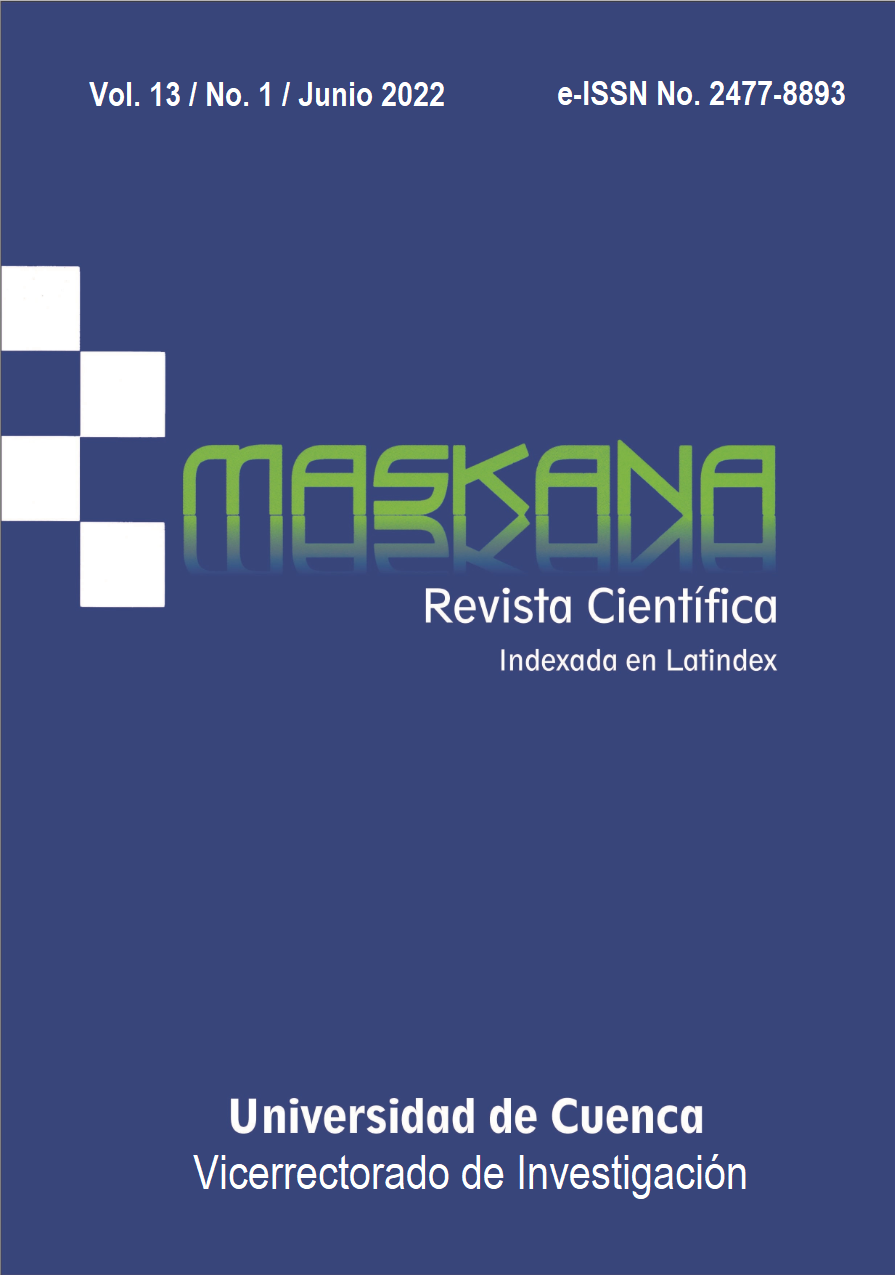Cooperativism and social entrepreneurship: alternatives for the common good
DOI:
https://doi.org/10.18537/mskn.13.01.06Keywords:
Cooperativism, social entrepreneurship, entrepreneurial intention, gender gapAbstract
The crises and economic, technological and social developments promote the formation of innovative and creative initiatives, which seek to reduce exclusions and social inequalities in the territories. Among these initiatives, cooperatives, the popular and solidarity economy and social entrepreneurship are identified, alternatives that share principles, practices and objectives aimed at the common good. In this context, this research aims to analyze the application of cooperative principles and the entrepreneurial intention of the people associated with the Jardín Azuayo Savings and Credit Cooperative. The data processing was carried out through the application of descriptive-explanatory-correlational quantitative techniques, based on the data obtained in the survey applied to a representative sample of 267 people. The results showed a «very high» level of perception of the application of cooperative principles, with the exception of the principle «economic participation among members». Regarding entrepreneurial intention, most of the associates have a «very high» level, observing that female members have a greater entrepreneurial intention than men. Finally, a positive and significant relationship is shown between the cooperative principles and the entrepreneurial intention of the members of the COAC Jardín Azuayo from Cuenca Canton, with the exception of the principle «economic participation among the members». In conclusion, cooperativism and social entrepreneurship, due to their collective and cooperative nature, drive development by promoting a social and solidarity economy, which has local roots, but has a global impact.
Downloads
Metrics
References
Acosta Véliz, M., Villacís Aveiga, W., & Jiménez Cercado, M. (2017). Factores que conforman la intención emprendedora de estudiantes de la Universidad de Guayaquil. Dominio de Las Ciencias, 3(3), 1116-1146. https://dialnet.unirioja.es/servlet/articulo?codigo=6244045
Asamblea Nacional de la República del Ecuador. (2011). Ley Orgánica de la Economía Popular y Solidaria y del Sector Financiero Popular y Solidario. Registro Oficial 444 de 10-mayo-2011, Reformado (7), 65. http://www.seps.gob.ec/documents/20181/25522/LEY ORGANICA DE ECONOMIA POPULAR Y SOLIDARIA actualizado noviembre 2018.pdf/66b23eef-8b87-4e3a-b0ba-194c2017e69ab
Asamblea Nacional del Ecuador. (2008). Constitución de la República del Ecuador, Registro Oficial 449. Quito: http://www.oas.org/juridico/pdfs/mesicic4_ecu_const.pdf
Bretos, I., & Marcuello, C. (2017. Revisiting globalization challenges and opportunities in the development of cooperatives. Annals of Public and Cooperative Economics, 1(88), 47-73.
Bretos, I., Díaz Foncea, M., Marcuello, C., & Marcuello, C. (2018). Cooperativas, capital social y emprendimiento: Una perspectiva teórica. REVESCO. Revista de Estudios Cooperativos, 128(128), 76-98. https://doi.org/10.5209/REVE.59775.1
Caycedo Sánchez, V. M., Galviz Cataño, D. F., Londoño restrepo, S. H., Echeverri Gutiérrez, M. S., Acosta Agudelo, L. C., & Penagos Bustamante, L. E. (2018). La brecha de género en la intención emprendedora. Análisis de variables socioeconómicas, perceptuales y de entorno en Colombia. En: Generación de conocimiento para la competitividad empresarial. Jovany Sepúlveda Aguirre (Comp.). Medellín: Sello Editorial Coruniamericana. 186 págs. https://americana.edu.co/medellin/wp-content/uploads/2020/09/Generación-de-conocimiento-para-la-competitividad-empresarial.pdf
Celis-Minguet, A. (2003). El nuevo cooperativismo. Guía de capacitación y asesoría para la creación y fortalecimiento de empresas de trabajo asociado. Vadell Hermanos Editores. Caracas. http://www.saber.ula.ve/bitstream/handle/123456789/18645/yuraima_linares.pdf?sequence=2&isAllowed=y
Chin, W. (1998). The partial least squares approach to structural equation modeling. In: G. Marcoulides (Ed), Modern Methods for Business Research (págs. 295-336). New Jersy: Lawrence Erlbaum Associates, Publisher.
Delgado Chávez, M., Mendoza Zamora, W., Quinche Chuqui, A., & Ponce Párraga, M. (2021). Impacto de la economía popular y solidaria en el sector cooperativo ecuatoriano. Recimundo, 5(2), 426-439. https://doi.org/10.26820/recimundo/5.(2).abril.2021.426-439
Díaz Bretones, F., & Lejarriaga Pérez de las Vacas, G. (2019). Emprendimiento social y empleabilidad. REVESCO. Revista de Estudios Cooperativos, 129(129), 9-15. https://doi.org/10.5209/reve.62962
García Rodríguez, L., Fuentes Guevara, D., & Pico González, B. (2021). Analysis of the entrepreneurial attitude in cooperative fishing societies in Mexico. REVESCO. Revista de Estudios Cooperativos, 139(139), 1-13. https://doi.org/10.5209/REVE.76632
García Sonora, L., & Monforte García, G. (2017). Cooperativas y emprendimiento social una unión que combate a la pobreza. Congreso. Investiga. Fca.Unam.Mx, Mx. http://congreso.investiga.fca.unam.mx/docs/xxii/docs/8.02.pdf
Giraldo-Mejía, W. A., & Vara-Horna, A. A. (2018). University-based social entrepreneurship in Latin America / el emprendimiento social de base universitaria en Latinoamérica. Universidad San Martín de Porres, Lima. Perú. https://www.administracion.usmp.edu.pe/investigacion/files/USMP-ACBSP-LIBRO-EMPRENDIMIENTO-SOCIAL-COMPLETO.pdf
Hair, J., Anderson, R., Tatham, R., & Black, W. (1999). Análisis Multivariante. Madrid: Prentice Hall.
Hernández Herrera, C. A., Sánchez Rodríguez, S., & Díaz Fragoso, O. (2018). Empoderamiento y cooperativismo femenino, tres estudios de caso de cooperativas lideradas por mujeres en la Ciudad de México. Acta Universitaria, 28(5), 72-83. https://doi.org/10.15174/au.2018.1642
Hernández Maldonado, R. (2019). Intención emprendedora: ¿es influenciada por factores de personalidad y género? RAN - Revista Academia & Negocios, 4(2), 1-12.
Iturralde, L. (2018). El modelo cooperativo: aplicación de los principios cooperativos. Trabajo Fin de Master, Instituto de Derecho Cooperativo y Economía Social de la UPV/EHU. 69 págs. https://www.gezki.eus/pdfs/d1a460390f.pdf
Lacave Rodero, C., Molina Díaz, A. I., Fernández Guerrero, M., & Redondo Duque, M. Á. (2015). Análisis de la fiabilidad y validez de un cuestionario. Actas de las XXI Jornadas de la Enseñanza Universitaria de la Informática (págs. 136-143). Andorra La Vella: Universitat Oberta La Salle. https://upcommons.upc.edu/bitstream/handle/2117/76844/JENUI2015_146-153.pdf?sequence=1
Méndez Martínez, C. & Rondón Sepúlveda, M. (2012). Introducción al análisis factorial exploratorio. Revista Colombiana de Psiquiatría, 41(1), 197-207.
Merenda, P. (1997). A guide to the proper use of factor analysis in the conduct and reporting of research: Pitfalls to avoid. Measurement and Evaluation in Counseling and Development, 30(3), 156-164. https://doi.org/10.1080/07481756.1997.12068936
Murillo Pérez, L. M. (2022). ¿Cómo genera valor el emprendimiento social de inclusión socio-laboral? Propuesta metodológica para la identificación y análisis de buenas prácticas. REVESCO. Revista de Estudios Cooperativos, 140(140), e78927. https://doi.org/10.5209/reve.78927
Prieto, G., & Delgado, A. R. (2010). Fiabilidad y validez. Papeles del Psicólogo, 31(1), 67-74.
Rodríguez, S. J., & Hernández Sánchez, J. (2019). Los principios cooperativos desde el dilema ético y el grado de aplicabilidad. Revista Aletheia, 11(1), 107-124.
Salinas Ramos, F., & Osorio Bayter, L. (2012). Emprendimiento y economía social, oportunidades y efectos en una sociedad en transformación. CIRIEC-España, Revista de Economía Pública, Social y Cooperativa, 75, 129-151.
Saltos Cruz, J. G., Mayorga Díaz, M. P., & Ruso Armada, F. (2016). La economía popular y solidaria: un estudio exploratorio del sistema en Ecuador con enfoque de control y fiscalización. Cofin Habana, 10(2), 55-75.
Sánchez Espada, J., Martín López, S., Bel Durán, P., & Lejarriaga Pérez de las Vacas, G. (2018). Educación y formación en emprendimiento social: características y creación de valor social sostenible en proyectos de emprendimiento social. REVESCO. Revista de Estudios Cooperativos, 129(129), 16–38. https://doi.org/10.5209/reve.62492
Streiner, D. (2003). Starting at the beginning: An introduction to coefficient Alpha and Internal Consistency. Journal of Personality Assessment, 80(1), 99-103. https://doi.org/10.1207/S15327752JPA8001_18
Tarapuez, E., Guzmán Díaz, B. E., & Parra Hernández, R. (2018). Intención emprendedora y aspectos sociodemográficos en Colombia. Espacios, 39(28), 18 págs.
United Nations. (2020) World youth report: Youth Social Entrepreneurship and the Agenda 2030. https://www.un.org/development/desa/youth/wp-content/uploads/sites/21/2020/07/2020-World-Youth-reportfull-FINAL.pdf.
Zambrano Vargas, Sandra., Zambrano Vargas, Y., & Chávez Otálora, A. (2020). Dimensiones para el estudio de la intención emprendedora en jóvenes universitarios. Espacios, 41(20), 344-354.
Published
How to Cite
Issue
Section
License
Copyright (c) 2022 Andrés Arias-Amaguaña, Sonia Sigüenza-Orellana, Lucía Pinos-Ramón, Gabriela Álava-Atiencie

This work is licensed under a Creative Commons Attribution 4.0 International License.
Copyright © Autors. Creative Commons Attribution 4.0 License. for any article submitted from 6 June 2017 onwards. For manuscripts submitted before, the CC BY 3.0 License was used.
![]()
You are free to:
 |
Share — copy and redistribute the material in any medium or format |
 |
Adapt — remix, transform, and build upon the material for any purpose, even commercially. |
Under the following conditions:
 |
Attribution — You must give appropriate credit, provide a link to the licence, and indicate if changes were made. You may do so in any reasonable manner, but not in any way that suggests the licenser endorses you or your use. |
| No additional restrictions — You may not apply legal terms or technological measures that legally restrict others from doing anything the licence permits. |






